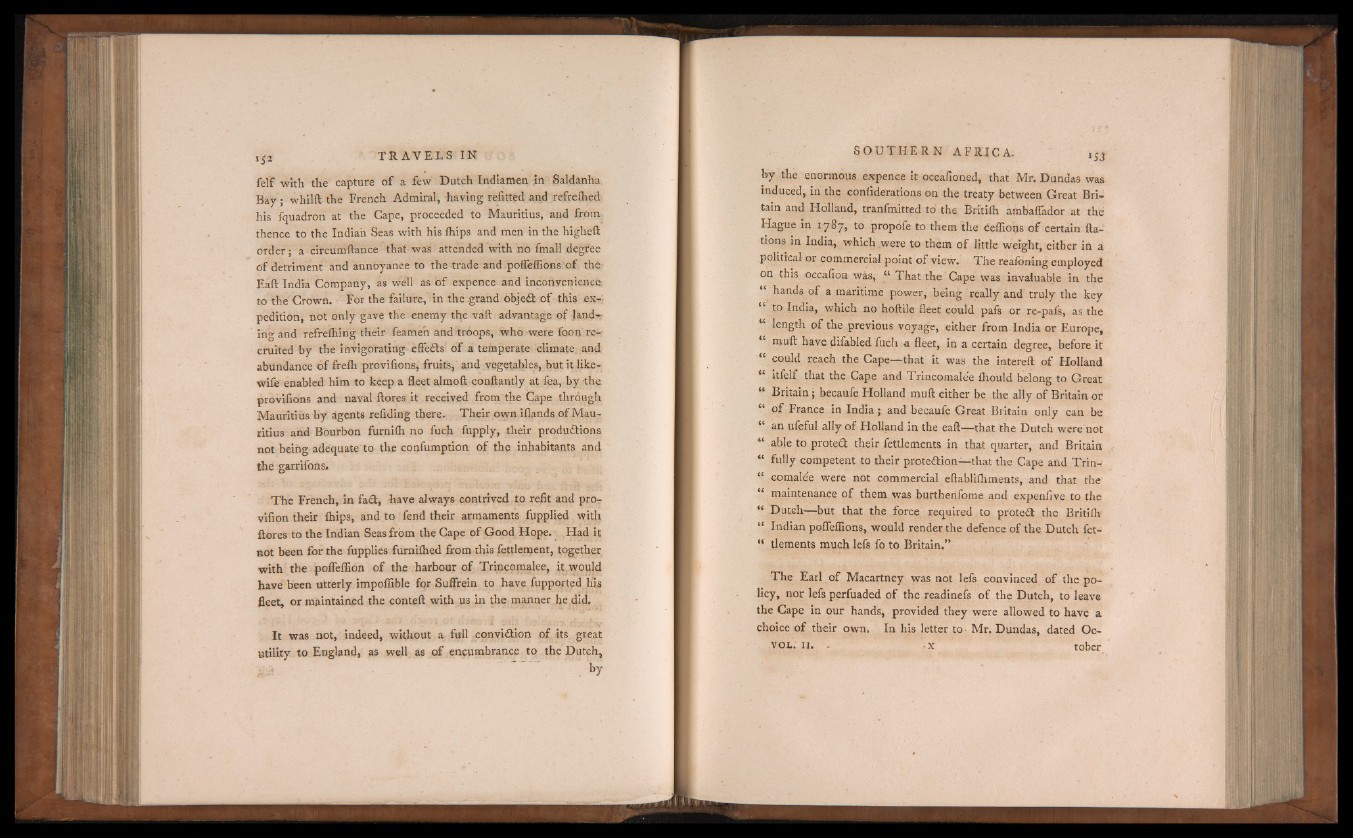
felf with the capture of a few Dutch Indiamen in Saldanha
B a y ; whilft the French Admiral, having refitted and refreihed
his fquadron at the Cape, proceeded to Mauritius, and from,
thence to the Indian Seas with his ihips and men in the higheft
order; a circumftance that was attended with no fmall degree
of detriment and annoyance to the trade and poffeffions of the
Eaft India Company, as well as of expence and inconvenience
to the Crown. For the failure, in the .grand object of this expedition,
not only gave the enemy the vaft advantage of landing
and refreihing their feamen and troops, who were fo.on re--
eruited by the invigorating effeds of a temperate climate and
abundance of freih provifions, fruits, and vegetables, but itlike-
wife enabled him to keep a fleet almoft conftantly at fea, by the
provifions and naval ftores it received from the Cape through
Mauritius by agents refiding there. Their own iflands of Mauritius
and Bourbon furnifh no fuch fupply, their produdious
not being adequate to the conftunption of the inhabitants and
the garrifons.
The French, in fad, have always contrived to refit and pror
vifion their Ihips, and to fend their armaments fupplied with
ftores to the Indian Seas from the Cape of Good Hope. Had it
sot been for the fupplies furnilhed from this fettlement, together
with the poffeffion of the harbour of Trincomalee, it would
have been utterly impoffible for Suffrein to have fupported his
fleet, or maintained the conteft with us in the manner he did.
It was not, indeed, without a full convidion of its great
utility to England, as well as of encumbrance to the Dutch,
by
by the enormous expence it occafioned, that Mr. Dundas was
induced, in the coniiderations on the treaty between Great Britain
and Holland, tranfmitted to the Britiih ambaflador at the
Hague in iy 8y, to propofe to them the Ceffions of certain Rations
in India, which were to them of little weight, either in a
political or commercial point of view. The reafoning employed
on this occafion was, “ That the Cape was invaluable in the
hands of a maritime power, being really and truly the key
to India, which no hoftile fleet could pafs or re-pafs, as the
length of the previous voyage, either from India or Europe,
muft have difabled fuch a fleet, in a certain degree, before it
“ could reach the Cape— that it was the intereft of Holland
“ itfelf that the Cape and Trincomalee ihould belong to Great
<c Britain; becaufe Holland muft either be the ally of Britain or
“ of France in India; and becaufe Great Britain only can be
<c an ufeful ally of Holland in the eaft— that the Dutch were not
u able to proted; their fettlements in that quarter, and Britain
“ fully competent to their protedion— that the Cape and Trin-
“ comalee were not commercial eftablifhments, and that the
“ maintenance of them was burthenfome and expenfive to the
** Dutch— but that the force required to proted the Britiih
“ Indian pofieffions, would render the defence of the Dutch fet-
“ tlements much lefs fo to Britain.”
The Earl of Macartney was not lefs convinced of the policy,
nor lefs perfuaded of the readinefs of the Dutch, to leave
the Cape in our hands, provided they were allowed to have a
choice o f their own. In his letter to- Mr, Dundas, dated Oc-
V o l . i i , - - x tober